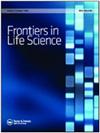变异芙蓉的染色体和核型分析
Q1 Biochemistry, Genetics and Molecular Biology
引用次数: 13
摘要
采用根尖南瓜法对突变芙蓉的染色体数目和核型进行了分析。结果表明,该菌株为二倍体,体细胞染色体数为2n = 92,相对长度指数为16L + 12m2 + 56m1 + 8S。核型公式为K(2n) = 2x = 92 =86m + 6sm,核型不对称指数为54.54%。核型为2C。本文章由计算机程序翻译,如有差异,请以英文原文为准。
Chromosome and karyotype analysis of Hibiscus mutabilis f. mutabilis
The number of chromosomes and karyotype of Hibiscus mutabilis f. mutabilis were analyzed with the root tip squash method. The results showed that H. mutabilis f. mutabilis is diploid, the chromosome number of the somatic cell is2n = 92 and the index of relative length is 16L + 12M 2 + 56M 1 + 8S. The karyotype formula is K(2n) = 2x = 92 =86m + 6sm and the asymmetrical index of the karyotype is 54.54%. The karyotype is 2C.
求助全文
通过发布文献求助,成功后即可免费获取论文全文。
去求助
来源期刊

Frontiers in Life Science
MULTIDISCIPLINARY SCIENCES-
CiteScore
5.50
自引率
0.00%
发文量
0
期刊介绍:
Frontiers in Life Science publishes high quality and innovative research at the frontier of biology with an emphasis on interdisciplinary research. We particularly encourage manuscripts that lie at the interface of the life sciences and either the more quantitative sciences (including chemistry, physics, mathematics, and informatics) or the social sciences (philosophy, anthropology, sociology and epistemology). We believe that these various disciplines can all contribute to biological research and provide original insights to the most recurrent questions.
 求助内容:
求助内容: 应助结果提醒方式:
应助结果提醒方式:


